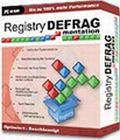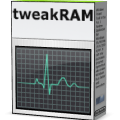Täglich bieten wir KOSTENLOSE lizenzierte Software an, die ihr sonst bezahlen müsstet!

Giveaway of the day — Registry Defragmentation 9.1
Registry Defragmentation 9.1 war am 25. August 2009! als Giveaway verfügbar!
Registry Defragmentation ist ein kleines Utility, das die Arbeitsleistung eures PCs deutlich verbessert. Diese Anwendung defragmentiert eure Windows Registrierungsdatei und gibt ihr eine ordentliche lineare Struktur. Registry Defragmentation ist ein Muss für alle, die öfters neue Software installieren und deinstallieren.
Das Programm führt physische Defragmentierung der Windows Registry-Datei durch. Dieses resultiert in einer linearen Struktur der Registry und kürzerer Reaktionszeit der Anwendungen. Darüber hinaus werden unbenutzte Einträge gelöscht - und die Regsitry schrumpft weiter! Keine Sorgen, manchmal beträgt die Größenänderung der Registry nur 1-5%, denn nicht die Größe, sondern die neue lineare Struktur der Registry ist von primärer Bedeutung.
System-anforderungen:
Windows 95/98/ME/NT/2000/XP/2003 and Vista
Herausgeber:
Elcor SoftwareHomepage:
http://www.elcor.net/rdefrag.phpDateigröße:
3.37 MB
Preis:
$11.95
Weitere interessante Titel

Advanced Registry Doctor Pro scannt euer System auf Fehler: dieses schlaue Programm kann viele Registry Probleme diagnostizieren und lösen und damit möglichen Funktionsstörungen und Abstürzen vorbeuegen. Die Leistung eures PCs wird signifikant verbessert. Das Programm bietet außerdem eine Vielzahl fortschrittlicher Optionen wie z.B. Registry Defragmentierung, einen eingebauten Scheduler, Backup- und Wiederherstellungs-Feature, History Log, Registry Toolkit und viele weitere tolle Extras.

Premium Booster optimiert euren PC in nur wenigen Schritten. Ihr werdet schnell merken, dass es wirklich wunderbar funktioniert und euer Windows durch die Verwendung des Premium Booster sehr viel stabiler wird, wenn ihr es regelmäßig verwendet.

TweakRam ist ein Tool zur Optimierung des PC-Speichers, das euren Computer auf Trab hält. Es verbessert deutlich die Arbeitsleistung eures Systems indem es mehr Speicher für Anwendungen und das Operationssystem freimacht.
GIVEAWAY download basket
Kommentare zum Registry Defragmentation 9.1
Please add a comment explaining the reason behind your vote.
The Good
* Easy to use.
* Works quickly.
* Can backup and restore registry.
* In-house ability to create and use System Restore points.
* Has a scheduler to allow you to automate tasks.
* Did not mess up my computer after a defrag.
The Bad
* No "analysis" report prior to actual defragmentation.
* Does not warn you to close all programs before you defrag.
* Scheduler is set to run automatically at boot by default.
* Registry backup files are not self-executing (you must have a program that supports the backup format to restore your registry).
* Opens a website in your browser advertising another product during installation.
* Mentions it is for "95-XP" some places and "XP-Vista" other places.
Free Alternatives
TuneUp Utilities 2008 ("TuneUp Registry Defrag" module)
For final verdict, recommdendations, and full review please click here.
Since the website says next to nothing, I read Ashraf's review. I'm giving the same advice I give for most tools which mess with the registry--stay far away from them.
The registry is a specialized database which Windows uses, primarily for Windows and program settings, but applications have been known to put all kinds of stuff in the registry which they aren't supposed to. It's the absolute worst idea which Microsoft ever came up with, apart from Windows itself. The idiots at Microsoft claim that the common database was supposed to provide for ownership and access control, but it fails miserably at both of those. Don't believe me? If there's access control, why are applications allowed to screw up critical registry entries for Windows and other applications? If there's ownership, why does uninstalling programs leave tons of their crap behind in the registry? The whole thing's a fiasco. The issue of ease of application portability (or lack thereof) is actually a very minor issue compared to the rest.
Based on what Registry Defragmentation 9.1 says it does and what Ashraf's review says it does, its documentation is extremely misleading. The registry consists of files, the physical fragmentation of those files is one thing. The registry is a database, the internal structure and fragmentation of the database entries within the physical files is another matter. It's primarily the second issue which Registry Defragmentation addresses, although it implies the first.
I don't care that some people will claim that they've "been using registry tools since they were knee-high and never had a problem". It's an extremely simple matter to determine that the registry is constantly in-use. While there are tools which will track all registry access, both reads and writes, what's relevant are actual changes over time. There are a number of registry snapshot tools, I use a licensed copy of Blue Project SysTracer Pro, an earlier version of which was a previous giveaway. If you take two snapshots over a couple of minutes and compare them, you'll see that all sorts of stuff has changed. Trying to terminate running applications is insufficient. Any utility which modifies the registry as a whole while Windows is running is going to mess stuff up, whether you notice it or not. Such utilities, if used, must be run prior to Windows boot, which Registry Defragmentation 9.1 doesn't do.
There are the issues about whether internal or external registry defragmentation should be done at all. The big-name disk defragmenters (Raxco PerfectDisk, Diskeeper, O&O Defrag, etc.) are all capable of handling the physical defragmentation of the registry and other system files safely. I doubt that they do the internal defragmentation of the database structure, but it's unnecessary, as Windows (at least XP and higher) will handle that automatically as-needed. Unlike Registry Defragmentation 9.1, there are other utilities which will do the internal database defragmentation prior to Windows boot.
Some people are big fans of registry backups. I'm definitely not a fan of all-or-nothing registry restoration, it's guaranteed to screw things up whether you notice or not (again, do traces on a running system and see how much changes, and how rapidly, and don't forget files and the registry have to be kept synchronized). Moderately safe things to do include System Restore (XP and higher), and when desperate, Use Last Known Good Configuration. I do occasional "backups" via SysTracer snapshots. Those let me examine what's changed and specifically select the individual items which I want to restore.
- "Registry Defragmentation is a small utility that does gigantic improvements in computer performance"
Yah, just run it 10 times and presto - your computer is 10 times faster. What a load of rubbish!
The facts are : Most registry optimization programs give very minor (if any) performance improvement. Registry operations, after all, are not the most frequent operation. The registry is a database used to store static date that may fragment over time. Most programs when starting-up do look up some values in the registry, and may also store some values when exiting.
The registry may acquire "holes" when deletes are done, as when one uninstalls a program. But it would require a hell of a lot of such operations to unbalance it so that the difference becomes noticeable. Shrinking the size of the registry by x percent doesn't mean at all that performance is improved by x percent, far from it. The improvement from defragmentation is usually measured in nanoseconds and is really unnoticeable and not worth the risk of rendering the computer unbootable. And no reason to do this more than about once a year.
I really dislike companies trying to profit from the non computer savvy and using scarecrow claims that have no validity at all.
More everyday free alternatives that never time out:
* Free Registry Defrag (can analyze first):
http://www.registry-clean.net/free-registry-defrag.htm
* NTREGOPT (get ERUNT with it to make a backup first):
http://www.larshederer.homepage.t-online.de/erunt/index.htm
The Registry is a dark and densely packed shedful of gelignite.
You may wish to walk into it holding a lighted candle in order to see what's on the shelves and how best to tidy 'em.
Whether or not you walk away unscathed is another matter, because the hot wax dripped by your candle may very well trigger a slow burn rather than an instant explosion.
So although the shed is still intact after your visit, and all your poking around / tidying of its contents, that's actually no guarantee at all: it could blow up in your face some time afterwards.
Though today's ultra-hyped software offering assaults the intelligence with claims of 'gigantic improvements' -- gigantic? What's that then, a factor of 10? 100? 1,000? -- it's ultimately no different to any other app ever marketed: the user must trust in the skill of the creator and hope that there aren't hidden flaws in the build.
Doing that with the non-critical may, just, be OK. But trusting to luck with something as critical as the computer's registry is faith at its most blind.
Reassurance does of course exist where an app has been around a long time -- for example, the freeware optimiser NTREGOPT, as notable for the way it shuns commercial hype as the way it has evolved and been refined thanks to feedback from users worldwide.
Similar reassurance also exists in the form of Revo Uninstaller, which does a great job in cleaning up Registry detritus after every uninstall anyway.
Today's software also seeks to provide that same reassurance too -- yet I don't know what happened to all the preceding versions, even though by implication there must've been a heck of a lot for this ever to have reached the status of build number v9.1.
Nor is it clear why, after all those successive builds, this software continues to be entirely incapable of reporting on the 'state' of the Registry before it even gets to work on it.
Doesn't it know? Can't it tell?
It certainly should, because only a fool consents to surgery without advance diagnosis.
Thanks, then, GOTD, but where today's software is concerned, a definite no thanks.
Whatever version it truly happens to be.


Guten Tag die Damen und Herren,
es ist nicht unbedingt eine komplette Neuinstallation erforderlich, um seinen Rechner von unerwünschten Einträgen in der Reg zu befreien. Es könnte auch mal von Nutzen sein, ein Büchlein in die Hand zu nehmen und die Reg selbst etwas abzuspecken. Es geht aber auch einfacher ... Man nehme sich solch ein Programm (Reg Back-up mit entsprechender Software, z.B dieses hier, Paragon oder Konsorten, vorausgesetzt) und lässt die Arbeit verrichten. Es ist sicherlich nicht so effizient wie eine Neuinstallation, aber sicherlich effizient genug. Eine Neuinstallation ist mit sehr viel Zeit verbunden; und Mal Hand aufs Herz, wer hat diese heutzutage schon. Ein sehr nettes Programm zum Testen für die Zeitgenossen mit viel Zeit, wäre "WinUtilities". Dieses Progi greift je nach Einstellung tief in die Reg ein und sollte daher den Erfahrenen vorbehalten sein. TuneUp Utilities ist zwar auch sehr nett, aber befreit nicht wirklich vom Rampsch in der Reg. Ist jedoch für den Laien sehr komfortabel zu bedienen .... Noch etwas zum Abschluss: Ohne etwas mal getestet zu haben, werden sicherlich auch keine Erfahrungen mit solchen Programmen gemacht. Selbst ist der MEISTER
Save | Cancel
Muss mein Beitrag #19 Revidieren. Das Programm ist Absolut Klasse.
habe es gerade getestet (Ich nehme ja sämtliche Software die hier angeboten wird, aber PSSSST!!) und ich muss sagen, mein Windows ME wurde erheblich schneller!!!!!
Gruß,
Euer Nutzlos
Save | Cancel
Prinzipiell: Finger weg von Registry Optimierern.
Registry Defragmentierung scheint zwar zu den harmloseren Optimierungen zu gehören, dennoch sollten aber vor allem Nutzer von Windows < XP (2000) vorher ein funktionierendes System-Backup erstellt haben, da sich Windows sonst im Extremfall möglicherweise nicht mehr starten lässt.
Die Systemregistrierung erreicht auf zugemüllten Systemen schon mal mehr als 60Megabyte und hat dann sehr wohl starken Einfluss auf die Gesamtperformance. Ob in so einem Fall die simple "Defragmentierung" dh. Neustrukturierung der Sysemregistrierungsdatei wirklich hilft, wage ich zu bezweifeln, viel mehr bringt eine saubere Neuinstallation. Es macht Sinn schon bei der Installation von Programmen zu überlegen was man wirklich braucht, da fast jedes noch so kleine Programm irgendwelche Einträge in der Systemregistrierungsdatei hinterlässt und diese damit beständig und irreversibel anwachsen lässt. Also: erst gar nicht soweit kommen lassen und wenn möglich Portable Applikationen oder Virtuelle Umgebungen benutzen.
Save | Cancel
genauso sinnlos wie die sogenannten Mem-"Optimizer" Tools
Save | Cancel
@shinbo: Dein System läuft nach ausführen dieses Teils besser ?
Wieviel verdienst du für diese Aussage ? Oder hast es selber "programmiert" ?
Thumbs Down !
Save | Cancel
Nettes kleines Programm mit akzeptabler Auswirkung auf den Bootvorgang und heute mal wieder kostenlos. Das Programm ist multilangual und somit auch auf die Deutsche Sprache umstellbar. Es waren keine Nebenwirkungen, wie von einigen oben beschrieben, bisher festzustellen. Im Grossen und Ganzen ein nützliches kleines Tool.
Save | Cancel
Ich schließe mich Freddys Meinung an.
Save | Cancel
Ich werde nie wieder irgendein Programm in meiner Registry wühlen lassen , nachdem ich die Erfahrung machen durfte , etliche Proggis funktionsuntauglich gemacht zu haben.
Save | Cancel
Geil, die einen wissen es besser als die anderen.
"JAA, das ist Toll" vs. "Sinnlos, braucht man nicht" vs. "Das und das hat das schon" ...
btw: Der Angegebene Preis ist in US$, bitte einmal zu Euro umrechnen (lassen).
Save | Cancel
@6 Auslogic - Gott bewahre...
ntregopt - deutsch/englisch, kostenlos ;)
http://www.larshederer.homepage.t-online.de/erunt/
Das Tool ist so steinalt, dürfte aber auch noch unter Win7 funktionieren.
Und erunt fürs backup ;)
Und für die harte Realität:
> manchmal beträgt die Größenänderung der Registry nur 1-5%,
Wohl wahr, aber Mumpitz, merkt kein Mensch.
> denn nicht die Größe, sondern die neue lineare Struktur der
> Registry ist von primärer Bedeutung.
Die Registry - die wird beim Windows-Start eh ins Ram geladen und
beim Beenden als letztes zurückgeschrieben. Von daher - schneller
geht es doch gar nicht.
Save | Cancel
in der Sysinternal Suite gibt es direkt ein Tool,was die Registry defragmentiert und auch fürs Backup kan man hier ein Tool finden-ganz umsonst-also wer für sowas mal Geld ausgeben will,sollte sich bissel informieren vorher!
Save | Cancel
Und wieder ein schönes Tool um seinen Rechner zu zerschießen. Leute, lasst die Finger von so einem Zeug. Ab XP werden nur die Registry-Teile in den Speicher gelanden die benötigt werden. Eine Defragmentierung ist da überflüssig und eher noch kontraproduktiv. In der CT gab es mal einen schönen Bericht darüber.
Save | Cancel
Statt zu verkleinern, war bei mir die system.dat unter WinME
DREI-mal
so groß.
Zweifelhaftes Kauf-Proggi.
Save | Cancel
In der Titelleiste steht: "Registry Defragmentation for Windows 95-XP".
Save | Cancel
Sehr nützliches Tool, pfundig! Nach der Ausführung von Reg.Defrag mit Sys.Neustart war
ein deutlich schneller Bootvorgang unverkennbar, laut Report eine Reg.Optimierung um 13%.
Jedenfalls mehr Geschwindigkeitszuwachs als jede Festplattendefragmentierung und Optimierung.
Einen "Virenalarm" gab es bei mir heute nicht.
Aber direkt nach der Installation erfolgt allerdings ein unnötiger "System-Check" wozu?,
mit Datentransfer via Internet. Meine Bewertung: 5 von 5*****
Danke an Gaotd!
Save | Cancel
GAOTD
BA5MD-L3WJX-QX2MB-YZPLD-WC9CX-CUVSC-K5RFQ-PW4BB-KX5V5-JVSG8
@Visitor: Dann kick doch endlich mal dein Antivir.
Save | Cancel
Wäre schon toll wenn du etwas konkreter werden könntest. So einfach was behaupten kann ja jeder. Was genau den ein BackdoorBoot ein Wurm oder was du toller Detektiv? Bei sowas krieg ich nen Hals ey....Willst du mit deiner vollkommen inhaltlosen Aussage erreichen das neimand anderes als du sich die Software runterlädt ? Hast du mal darüber nachgedacht das die Herstellerfitma der Software (elcore software) dich verklagen kann wegen übler Nachrede etc.. also erst Gehirn enschalten dann den PC.
Save | Cancel
Ah - Problem gelöst. Ich habe die Werbung rechts heruntergeladen. Tschja.... hat so schön bunt ausgeschaut. *lach*
Save | Cancel
Ich habe das Ding heruntergleaden und bevor es etwas repariert möchte es sich registriert haben - leider bekomme ich die Meldung die Seite wäre nicht erreichbar.
Schade, die Beschreibung klang gut.
A.
Save | Cancel
Registry-Defragmentierung bieten andere Tuning-Programme als Dreingabe.
Der Menüpunkt "System-Backup" setzt einfach nur einen Systemwiederherstellungspunkt. ( unter WinXP: Programme/Zubehör/Systemprogramme/Systemwiederherstellung )
Der einzig brauchbare Menüpunkt ist "Registry-Backup" um die Reg-Daten von GAOTD zu sichern, aber auch dafür wird sich wohl ein anderes Programm eignen.
... und weg damit.
Save | Cancel
Von solchen Tools gibt es massenweise kostenlos. Tuneup usw haben sowas nebenbei integriert. Dafür 11,95 bezahlen? Daumen runter
Save | Cancel